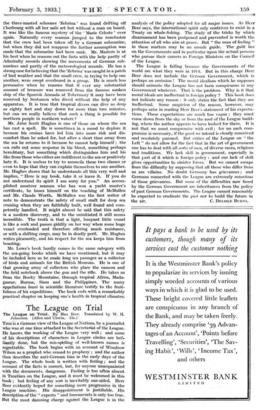The League on Trial
The League on Trial. By Max Beer. Translated by W. H. Johnston. (Allen and Unwin. 15s.)
Tars is a German view of the League of Nations, by a journalist who was at one time attached to the Secretariat of the League. He knows the working of the League very well ; and some of his descriptions of characters in League circles are brit. liantly done, but the mis-spblling of well-known names is regrettable. The book begins with an account of Woodrow Wilson as a prophet who ceased to prophesy ; and the author then describes the anti-German bias in the early days of the League. The whole book is written with feeling ; and the account of the facts is correct, but, for anyone unacquainted with the documents, dangerous. Feeling is too often absent in Treatises on the League, and it must be welcomed in this book ; but feeling of any sort is inevitably one-sided. Herr Beer evidently hoped for something more progressive in the League machine. His disappointment is justifiable. His description of the " experts " and bureaucrats is only too true. But the most damning charge against the League is in Hie analysis of the policy adopted for all major issues. As Herr Beer says, the international spirit only contrives to exist in a Treaty on whale-fishing. The study of the tricks by which disarmament has been postponed and prevented is worth the attention of all who aim at peace. But " the man of feeling " in these matters may be an unsafe guide. The guilt lies on the Governments and in particular upon the actual persons who pursue their careers as Foreign Ministers on the Council of the League.
The League is failing because the Governments of the world are what they were in 1914. But in this charge Herr Beer does not include the German Government, which is perhaps an omission I The moral idealism which he supposes should animate the League has not been conspicuous in any Government whatever. That is the problem. Why is it that moral ideals are ineffectual in foreign pOliey ? This book does not indicate any reason : it only states the fact that they are ineffectual. Some suspicion of the reason, however, may perhaps arise in reading Herr Beer's statement of his expecta- tions. These expectations are much too vague : they must come down from the sky or from the roof of the League build- ing, where the author appears to have looked for them. It is not that we must compromise with evil ; for no such com- promise is necessary, if the good we intend is clearly conceived and resolutely pursued. But critics of the League on " the Left " do not allow for the fact that in the art of government one has to deal with all sorts of nun, of diverse races, religions and traditions. We lack skill in government, especially in that part of it which is foreign policy : and our lack of skill gives opportunities to sinister forces. But we cannot escape from the difficulty by supposing that all those who differ froin us are villains. No doubt Germany has grievances ; and Germans connected with the League are extremely conscious of those grievances. But some of the difficulties now faced by the German Government are inheritances front the policy of past German Governments. The League cannot reasonably be expected to eradicate the past nor to build the future in




































 Previous page
Previous page